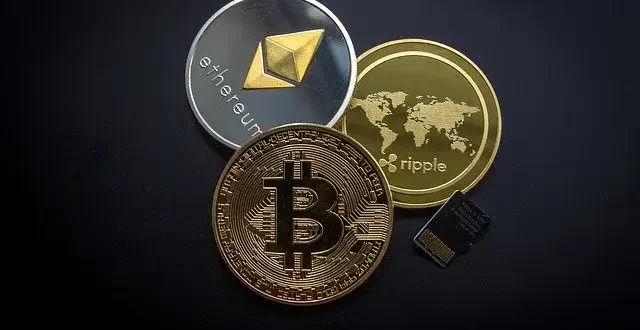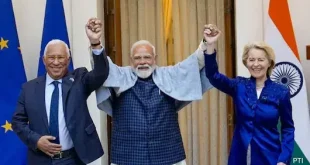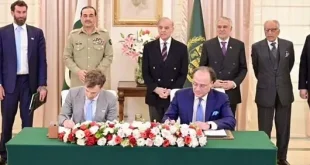Date: May 29, 2025 | By: NewsMakers Desk
. A Digital Leap That Positions Pakistan at the Forefront of Financial Innovation
The Big Announcement
In a groundbreaking moment that’s making global headlines, Pakistan has officially announced its first state-backed Bitcoin reserve, becoming the first developing country to do so.
The declaration was made by Bilal Bin Saqib, the Special Assistant to the Prime Minister on Blockchain and Crypto and CEO of the Pakistan Crypto Council (PCC), during the prestigious Bitcoin Vegas 2025 summit in the United States.
Bitcoin Vegas 2025?
Bitcoin Vegas is one of the largest and most influential cryptocurrency conferences in the world. During this high-profile event, Bilal Bin Saqib stunned the audience by unveiling Pakistan’s bold vision for its digital future.
Key Highlights from the Event:
- Launch of Pakistan’s National Bitcoin Reserve
- Creation of the National Bitcoin Wallet
- Allocation of 2,000 megawatts of electricity for digital infrastructure
- Establishment of the Pakistan Digital Assets Authority
Global Figures in Attendance:
- U.S. Vice President J.D. Vance
- Eric Trump
- Donald Trump Jr.
Bilal also publicly thanked U.S. President Donald Trump for helping de-escalate recent tensions between India and Pakistan and for his role in promoting cryptocurrency on the global stage.
What is the National Bitcoin Wallet?
The National Bitcoin Wallet is a state-controlled digital vault designed to hold Bitcoin and other cryptocurrencies under official government custody.
Purpose and Benefits:
- Serves as a reserve asset for the national economy
- Enhances financial security through blockchain transparency
- Reduces reliance on traditional fiat reserves
- Enables Pakistan to receive, store, and utilize digital assets
This initiative positions Pakistan as a leader in crypto adoption and innovation among developing countries.
Energy for Innovation: 2,000 Megawatts Allocated
The Pakistani government is powering this revolution with 2,000 megawatts of surplus electricity, which will be used for:
- Bitcoin mining operations
- AI and blockchain data centers
This not only opens new revenue streams but also attracts:
- International blockchain firms
- Independent tech companies
- Crypto entrepreneurs and miners
“Allocating 2,000 MW to the digital economy is not just a policy — it’s a vision,” said Bilal.
Regulating the Future: Pakistan Digital Assets Authority
To regulate this digital transformation, Pakistan is setting up the Pakistan Digital Assets Authority, which will oversee:
- Blockchain infrastructure
- Crypto asset regulation
- Licensing for miners and exchanges
- Compliance with international financial standards
This is a major step towards building a transparent, secure, and internationally credible digital economy.
The Numbers Driving Pakistan’s Digital Uprising
Bilal Bin Saqib shared compelling stats that prove this is more than a dream — it’s already in motion:
- 40 million crypto wallets in Pakistan
- Median age: 23 years
- Among the largest freelance economies globally
“These aren’t just numbers — they’re a story,” Bilal emphasized.
“A story of youth, potential, and transformation.”
A Shift in National Identity
“Pakistan is not defined by terrorism or poverty anymore — we are defined by our digital revolutionary strength,” said Bilal.
He went on to say:
“I’m not here as a minister — I’m here as the voice of a generation.”
This marks a significant departure from decades of negative headlines. Bilal’s message was clear: Pakistan is ready to lead the future, not follow the past.
Global Message: “Come to Pakistan”
Bilal Bin Saqib’s speech ended with an open invitation to the world:
“If you’re truly building something new — come to Pakistan. This is where dreams turn into digital reality.”
He emphasized that Pakistan is no longer just a consumer market — it’s the central station of the global blockchain revolution.
Why Pakistan Needs Blockchain?
Here’s why this technology is critical for Pakistan’s future:
- Modernizes outdated financial systems
- Boosts transparency in governance and banking
- Cuts remittance costs for overseas Pakistanis
- Attracts tech investment and digital entrepreneurs
- Promotes financial inclusion for the unbanked
Blockchain is the answer to many of Pakistan’s systemic issues — from corruption to financial exclusion.
How Pakistanis Can Benefit from the Bitcoin Revolution
Whether you’re a student, freelancer, overseas Pakistani, or small investor — here’s how to get involved safely and smartly:
✔️ Learn the Basics:
- What is Bitcoin? A digital currency built on blockchain, a decentralized and secure technology.
- Digital Wallets: Store your crypto safely.
- Crypto Exchanges: Buy, sell, or trade coins.
Benefits:
- Easier, cheaper international remittances
- Access to global freelance payments
- New job opportunities in blockchain development
- Investment in decentralized finance (DeFi)
Caution:
- Crypto markets are highly volatile
- Beware of scams and fake platforms
- Always do your research and follow local laws
Start small, stay informed, and never invest more than you can afford to lose.
📌 Final Thoughts: A Nation Reborn Digitally
Pakistan’s entry into the world of sovereign Bitcoin reserves is more than symbolic — it’s strategic. It tells the world that:
- Pakistan is young, digitally literate, and ambitious
- The country is not stuck in the past, but building the future
- Innovation, not instability, will define its next chapter
“This moment was more than just a speech — it marked the beginning of Pakistan’s global digital identity.”
Summary: Why This Moment Matters
| Aspect | Details |
|---|---|
| Announcement | Pakistan’s first state-backed Bitcoin reserve |
| Key Figure | Bilal Bin Saqib, SAPM on Blockchain & Crypto |
| Location | Bitcoin Vegas 2025 |
| New Institutions | National Bitcoin Wallet, Digital Assets Authority |
| Energy Investment | 2,000 MW for crypto & AI |
| Impact | Global recognition, financial innovation, youth empowerment |
Pakistan has entered a new chapter — and the world is watching.
Stay with NewsMakers as we bring you more stories shaping the digital transformation of Pakistan.




